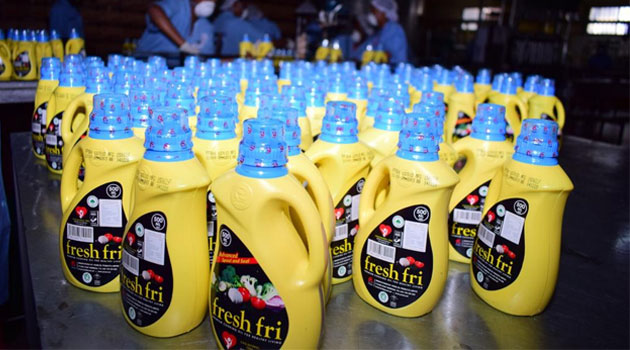
The firm devised an elaborate plan whereby they produce their own power which runs day to day activities in the busy manufacturing plant/CFM
NAIROBI, Kenya, Jun 21 – A local manufacturer has invested in a steam power plant in a bid to cut down on production costs which has been cited as the greatest challenge facing the manufacturing sector.
The recycling of steam used in soap manufacturing has reduced power bills at the Pwani Oil Refineries Limited – a leading producer of edible vegetable fat – by at least 50 per cent, according to Rajul Malde, the firms Comercial Director.
“The Kikambala soap manufacturing plant requires 2.5 megawatts of electricity per month to run smoothly .This power plant generates 1.5 megawatts to supplement the electricity they get from the national power grid,” Malde told Capital FM news during a visit to the plant last week.
The firm devised an elaborate plan whereby they produce their own power which runs day to day activities in the busy manufacturing plant.
The firm reuses steam obtained from the process of heating crushed palm nuts to make detergents to power its steam plant which then provides power to supplement its energy needs.
The soap making process requires steam heat crushed palm nuts to obtain oil which is then mixed with other chemicals to make detergents.
According to Malde, the process consumes a lot of electricity during boiling of water to produce the steam.

Some of the widely known products in the market include, Whitewash bar soap, Whitewash extra, Popco bar soap, Diva bathing soap, the SAWA bathing soap, Salit Oil, Mpishi Poa and Fresh Fry cooking oil/CFM
The company also uses steam to run a chiller for humidity and temperature control which are very vital in the production processes.
“We use coconut shells, macadamia shells and saw dust as fuel in steaming the water used in the industry,” he said.
Producing electricity and heat together, instead of separately, makes the systems more energy efficient, Malde explained.
The technology makes more financial sense in regions or countries with high electricity prices like in Kenya.
The energy saving model further delivers significant savings since the firm needs both electricity and thermal energy consistently.
Malde also said that plans are underway to put up a solar power plant, which has a capacity to produce one megawatt.
“We have put everything in place to have our own power plant by next year, which will cut down the cost of production further,” he said.
Pwani Oil started operations in 1981 in Mombasa, and has continued to expand their range of goods.
Some of the widely known products in the market include, Whitewash bar soap, Whitewash extra, Popco bar soap, Diva bathing soap, the SAWA bathing soap, Salit Oil, Mpishi Poa and Fresh Fry cooking oil.


































